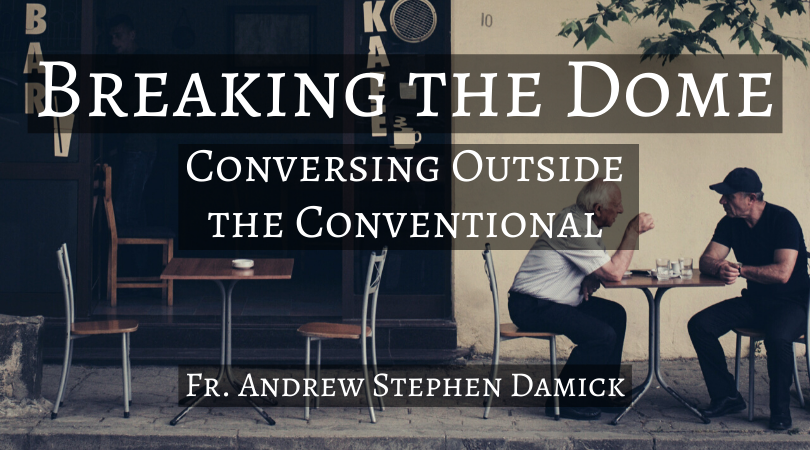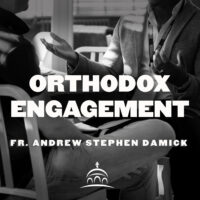
One of the questions that Orthodox Christians who are obedient to Christ’s evangelistic commission ask themselves goes like this: How do we get outside The Dome? That is, how do we effectively reach the people who aren’t already in front of us and listening to what we’re saying?
It’s a question that marketing people ask themselves, too, but for different reasons. I now work in Orthodox Christian media with an emphasis on evangelism, and it’s therefore a question that I ask from multiple angles and discuss with my co-workers, as well.
Despite our being Orthodox Christians, “The Dome” does not generally mean the domes of a church, but rather it refers to the universe of discourse as generally observed within our circles, the kinds of things we talk about and the people who are reached by this discussion. Here’s how universe of discourse was defined by English mathematician and philosopher George Boole:
In every discourse, whether of the mind conversing with its own thoughts, or of the individual in his intercourse with others, there is an assumed or expressed limit within which the subjects of its operation are confined. The most unfettered discourse is that in which the words we use are understood in the widest possible application, and for them the limits of discourse are co-extensive with those of the universe itself. But more usually we confine ourselves to a less spacious field. Sometimes, in discoursing of men we imply (without expressing the limitation) that it is of men only under certain circumstances and conditions that we speak, as of civilized men, or of men in the vigour of life, or of men under some other condition or relation. Now, whatever may be the extent of the field within which all the objects of our discourse are found, that field may properly be termed the universe of discourse. Furthermore, this universe of discourse is in the strictest sense the ultimate subject of the discourse. (The Laws of Thought, 1854)
That is essentially a long way of saying that we limit ourselves when we talk about things. And while Boole wasn’t talking about communities of people, these universes of discourse are limited by the people using them. And they also — and this is crucial for my purpose — limit the people themselves. Our community limits its discussions in certain ways, and those discussions in term limit us. The things we talk about affect what we imagine and also what we do.
Conventions of conversation also become and reinforce limits of imagination, too. If you’re not used to people talking about, say, space travel, it may not even occur to you to try it or that it is even a thing.
The Crippling of Orthodox Evangelism
I believe that Orthodox Christian evangelism is being crippled by our failure to expand our conversation.
Now, you might object: Orthodox people talk about and do Orthodox things. And if non-Orthodox people just aren’t going to accept Orthodox things, well, that is their failure, not ours. Right?
Wrong.
In fact, our problem is not just that the world doesn’t want what we’ve got. (Though of course that is also a problem.) But if we take a long look at the whole of Orthodox Christian tradition with its many and rich witnesses — the Holy Scriptures, the liturgical life, the writings of the Church Fathers, the decrees of the Ecumenical Councils, lives of the saints — then we will see that there are many truly and deeply Orthodox things which we are not talking about and not doing.
Let’s get back to that “dome.” We Orthodox Christians may conceive of our life as under a church dome. Under that dome is all the Orthodox things. We collect them there, oil and polish them up, and talk about them and participate in them in the ways that we’re used to. But what we don’t often realize is that the ways we’re used to — especially the set of things we’re used to — are not coterminous with the Orthodox Christian tradition.
I will pick two examples to discuss here that are areas of Orthodox tradition that I myself have failed to appreciate and appropriate and therefore failed to apply. But I am now trying to do those things, and I mention them here not to be self-serving but to illustrate what I mean.
Let’s talk about demons
Yeah, that’s right — demons. All but the most secular materialist Christians acknowledge the existence of demons — fallen angels who rebelled against God and now try to get us to do the same thing. Yet the way that most of us talk about them is as if they’re really on the periphery of our Christian experience.
Yet in the Gospels, Jesus is constantly doing exorcisms. There are hundreds of references in Scripture to demons, false gods, unclean spirits, evil spirits, devils, etc. Liturgical tradition is full of them. The Orthodox baptismal service constantly references them, with its whole beginning dedicated to driving them out and turning away from them.
But why don’t we seem to talk about them very much? I believe it’s because we’ve become limited by the inheritance of the “Enlightenment,” which limited man’s vision to the three-dimensional world of the senses. So as Christians we still believe they exist, just, well… not in my backyard, you know?
But what if battling demons while standing alongside angels and saints is actually a core function of the Christian life and maybe even the very definition of what we’re supposed to be doing? While so many of us turn the struggle for theosis into a kind of Christian self-improvement plan, we are failing to mount up the attack against the enemies of God, participating in His works and thereby becoming like Him and being ranked with the angelic Sons of God (cf. Luke 20:36).
Once I realized that here was a huge area of conversation that very few of us — despite saying that we believe in it — were actually engaging in, I approached my friend Fr. Stephen De Young who has been writing about this for years and said, Hey, let’s do a podcast about this. And so was born one of the two new shows I’m doing lately, The Lord of Spirits. It blows my mind every time we do an episode, and I hope it blows yours, too, but even more, I hope it inspires you to get serious about the presence of spirits — both good and evil — in this world.
And you know what? A lot of non-Orthodox and non-Christian people are really concerned by this and want to know what to do. And Orthodox tradition has a whole way of speaking about spirits and ways of dealing with them.
Let’s talk to anyone
Another failure I’ve seen is that Orthodox Christians mostly aren’t even interested in engaging “outside the dome” with people and ideas that aren’t officially “Orthodox.” Or, if they do, they think that you have to pick just one of two strategies — polemic or compromise.
In other words, if you want to address the world, you can take one of two postures: You can level polemic, telling the world everything that’s wrong with it, telling the non-Orthodox and the non-Christian that because of their ignorance, unintelligence or dishonesty (or some combination thereof), they are almost certainly headed for damnation (not that we know who is damned, but we’re okay with strongly implying it). And maintaining relationships with such people is probably a betrayal. Or you can embrace compromise, telling the non-Orthodox and the non-Christian that we need them to help us revise and correct the Orthodox tradition (especially moral dogma these days). If we’re going to reach the world, we need to be more like the world. We know so much more now.
To that, I say: Nonsense.
No, really, it’s just nonsense. Polemic in Scripture and in the Fathers is reserved for those attacking and undermining the Church. The very existence of non-Orthodox and non-Christians is not an attack on the Church. And compromise is just unconscionable. If God has revealed the truth through the apostles and prophets, we have no business correcting them. The challenge with understanding Church tradition in the current day is not about laying down judgment upon it by people utterly unqualified to judge (“It’s current year!” is just not an argument), but rather in going deeper than we’re probably used to (see previous section about demons) to be formed by it and to ask why? and how?, not whether.
My motto these days is Neither polemic nor compromise, but engagement. Engagement means to seek out conversation and relationship with people of good faith, even when we disagree. It means that I might have something to learn from them and about them, even while holding to the integrity of the Orthodox Christian faith.
I do think that we are generally getting better at this, but we still have a very long ways to go. And I wanted to work on this a lot more myself. So another of my new podcast projects is Orthodox Engagement. (Kind of an obvious title, right? Though apparently some people thought it was about weddings.) It’s in-depth interviews with all kinds of people about all kinds of things. The point is to connect, to engage.
I deliberately picked a somewhat controversial Orthodox Christian who works in media (not Orthodox media, not even Christian media) for my first guest, because it occurred to me that, if we can’t even talk to someone who is trying to be a faithful Orthodox Christian (even if he says stuff I disagree with and is controversial), then we really deserve the ghetto we’ve created for ourselves. I got some pushback over having this guest on, and that was a signal to me that a lot of us just aren’t comfortable with engagement. We just really prefer polemic or compromise.
Sorry, but that’s not my deal.
So about that dome
I don’t think we should conceive of our “dome” as a church dome, because we fool ourselves into thinking that whatever we’re used to is what the Orthodox Christian faith is. But the Orthodox Christian faith includes that great commission of going into all the world, casting out demons, baptizing the nations, making disciples, and teaching everything Christ commanded.
We have no business hiding under a dome.
The domes of our churches do encompass something, but it should not be us, at least not in the sense of letting ourselves be complacent about appropriating the whole of Orthodox tradition. Our churches encompass our ritual sacrifice to God, where we commune with Him. But the end of the Divine Liturgy says “Let us go forth in peace.”
Having received Christ into ourselves, we are sent forth to bring the nations under that dome of communion. We are not being commanded to stand at the door of the church and just yell out, “Come and see! Come and see! Oh, not interested? Well, your loss, I guess.”
No, we are sent forth. That means that we need to go forth into all the world and that we also need to go forth into all of Orthodox tradition. Being catechized in the Orthodox faith is not something that you achieve by going to some classes. It’s truly a lifelong process. And it takes humility.
So let’s break the false domes of our conventional universe of discourse and look up to see the very dome of heaven. Just because something is conventional doesn’t mean that it’s the whole of Orthodox Christianity.






Brilliant, Father! I’ve been struggling recently with the “come and see” approach some advocate for evangelism. No doubt inviting people to our services is an important tool, it just seems so passive and it gives the sense that we’re ultimately not obligated for bringing people to faith. This article gives words to what I’ve been wrestling with, so thank you!
Excellent 40x. Thank you.
Very well done Father! I have been a big proponent of what you shared but have been struck down and put in the “dome corner” for the amount of videos of engagement I have done. It seems to me there are very conservative, traditional priests that see it only one way and they don’t like or consider these evangelical sharing worthwhile. There really needs to be an “awakening” with sharing the gospel to many in a communicative and engaging way as you disclosed. Lord have mercy.